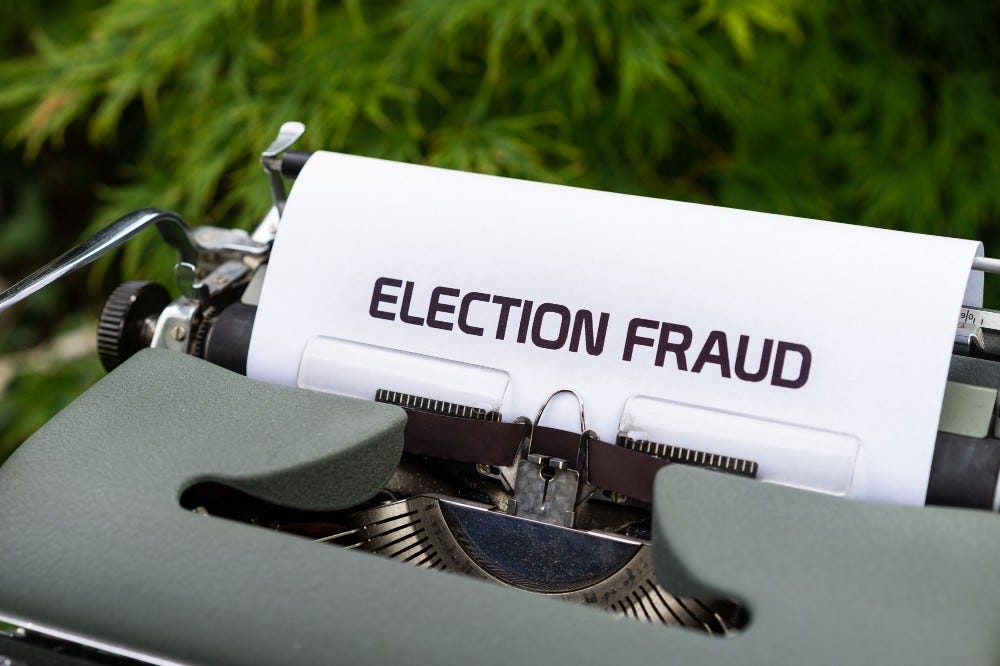Notes on a Criminal Conspiracy
January 6th wasn't the start of a plan to subvert the government. It was the culmination of a coup plot in the works for months

I might have been the last person in this country to watch The Wire, the HBO crime drama that ran from 2002 to 2008. Although it never won any awards, today, many critics regard it as one of the greatest television shows of all time. Despite this, somehow, it didn’t hit my radar until the pandemic sequestered me last year.
One of my favorite scenes in the entire series is from the show’s third season. In the scene, Stringer Bell, a drug kingpin played by a young Idris Elba, chairs a meeting of The New Day Co-Op, an alliance of some of Baltimore’s most notorious drug dealers. When the meeting adjourns, Bell notices a fellow sitting alone in the corner of the room.
As Bell draws closer, he realizes the young man is scribbling away in a legal pad. According to Roberts Rules of Order, the man explains, meetings require minutes, so he’s taken the initiative by memorializing the discussions between the group of drug dealers. Upon hearing this, Bell snatches the man’s legal pad, rips out the page of notes, and asks the following question:
N**ga, is you taking notes on a criminal f*cking conspiracy? What the f*ck is you thinking, man?
Because the corruption and outright criminality depicted in the show are still fresh in my mind, I guess it’s easier to spot occasions when the artistic brilliance of The Wire imitates real life.
In late December of last year, the former president spoke with top Justice Department officials regarding the 2020 presidential election, telling them to “just say the election was corrupt and to leave the rest to me.”
How do we know this?
It turns out there are notes. Unlike the would-be stenographer in The Wire, then-acting Deputy Attorney General Richard Donoghue took copious handwritten notes memorializing Acting Attorney General Jeffrey Rosen’s phone calls with the former president.
According to Donoghue’s handwritten records, an hour before announcing Bill Barr’s departure from the Department of Justice, Trump ramped up the pressure on Rosen, hoping the incoming acting attorney general would acquiesce and amplify Trump’s election fraud lie.
Trump tried the same scheme on Rosen he used to squeeze the president of Ukraine. He didn’t care if there was a legitimate investigation into election fraud. Just like with Ukraine, Trump wanted the announcement of an investigation.
After multiple White House attempts to get Rosen on board with the Big Lie failed, Trump went around him, enlisting Jeffrey Clark, then the head of the department’s civil division, to help subvert the election.
In addition to secretly meeting with Trump to devise a plan to oust Rosen, Clark also drafted a letter alleging massive fraud in Georgia — a last-ditch effort to overturn that state’s votes in the 2020 presidential election. If that wasn’t enough, it appears Clark had a hand in the abrupt resignation of Georgia U.S. Attorney B.J. Pak.
Last week we learned Rosen testified before the Senate Judiciary Committee for seven hours — and the Justice Department’s inspector general — regarding attempts by the Trump White House to overturn the 2020 election.
The revelations of the last few days are the most definitive evidence yet that, rather than the beginning of an attempt to overturn the 2020 election, the January 6th insurrection was the culmination of a months-long campaign to subvert our government.
Finally, the media intelligentsia is framing Trump’s post-election machinations the way people like Fiona Hill, the former National Security Council official, did months ago — as an attempted coup.
But while this new information sheds new light on what many have suspected for months, one question remains — what took so long? To a large extent, the disclosures merely confirm public reporting that’s trickling out in dribs and drabs.
Back in January, Katie Benner of The New York Times reported that Clark plotted with Trump to potentially oust Rosen and then use the power of the Justice Department to force lawmakers in Georgia to throw out their presidential election results. But when Rosen testified before the House Oversight Committee in May, he was tight-lipped.
When Representative Jerry Connelly (D-VA) directly asked whether the former president pressed him or the Justice Department to overturn any part of the 2020 election results, Rosen refused to answer, for mysterious reasons still not understood. Why?
In a recent story for The New York Times, Benner writes that Rosen spent the better part of this year talking with the Justice Department over what he could tell investigators. After Trump’s legal counsel announced that the ex-president wouldn’t block former DoJ officials from speaking to investigators, Rosen hightailed it to House Oversight and the DoJ inspector general:
Douglas A. Collins, a lawyer for Mr. Trump, said last week that the former president would not seek to bar former Justice Department officials from speaking with investigators. But Mr. Collins said he might take some undisclosed legal action if congressional investigators sought “privileged information.”
Mr. Rosen quickly scheduled interviews with congressional investigators to get as much of his version of events on the record before any players could ask the courts to block the proceedings, according to two people familiar with those discussions who are not authorized to speak about continuing investigations.
He also reached out directly to Michael E. Horowitz, the Justice Department’s inspector general, and pledged to cooperate with his investigation, according to a person briefed on those talks.
So what changed? Why is Rosen forthcoming now, when he wasn’t in May? The Senate didn’t confirm Merrick Garland until mid-March, so perhaps it’s taken a while to sort everything out. Or, as the dam of leaks broke, maybe Rosen wanted to get his version of the story out first.
We may never know why it took Rosen seven months to talk, but one thing is for sure. While Trump and his minions failed, they came frighteningly close to dismantling our democracy.
If not for a few civil servants, things may have played out quite differently. Bottom line — America got lucky. Thank goodness someone took notes on this criminal conspiracy.


